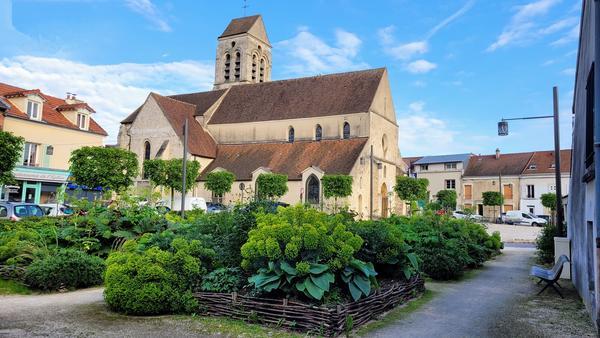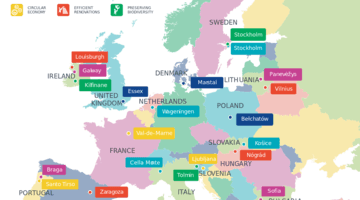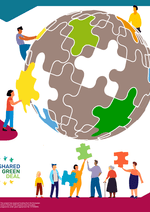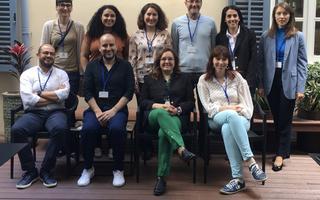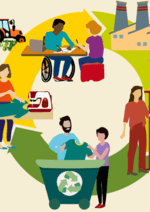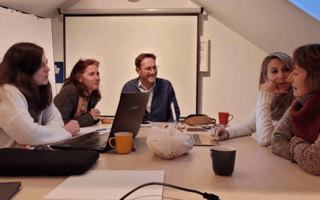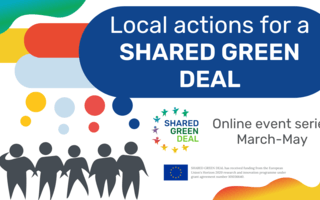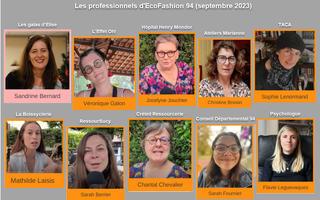Innovative sufficiency solutions and business models for circular economy in the textile sector in Val-de-Marne
The Val-de-Marne en Transition local experiment aimed to create a Local Accelerator Hub in collaboration with a group of 10+ local entrepreneurs, associations, and institutions. The hub was planned to focus on rethinking the textile lifecycle by co-creating innovative and disruptive selling, buying, and upcycling solutions on a local scale. The experiment also aimed to generate local job opportunities and increase the resilience of participating stakeholders and the local community.
The experiment would primarily involve actors from the textile sector, starting with clothing, in the T11 (Grand Paris Sud Est Avenir) intercommunal structure (territory) and potentially extend its focus to the entire Val-de-Marne department covered by the 3 territories: theT10 (Paris-Est-Marne et Bois), T11 (Grand Paris Sud Est Avenir) et T12 (Grand-Orly Seine Bièvre) terrotories., encompassing 53 municipalities. The goal was to inspire and motivate other actors to initiate similar actions in the region.
Local Context
The Val-de-Marne department is located in the inner ring of Paris and has a dense population of 1.4 million inhabitants. It is predominantly an urban area with most residents living in small and medium-sized cities.
The Val-de-Marne en Transition (VdMT) association fosters collaboration between local citizen-led initiatives and undertakes projects with broader scopes. Their cooperative company, L’Alternateur, established in 2021, focuses on social economy, innovation, and ecological transition. It serves as an incubator, providing support and training for individuals interested in creating their own projects or initiatives in the field.
Specific Needs and Challenges
Local second-hand stores and waste recovery centers face challenges in maintaining a resilient economic model. Currently, waste recovery centers heavily rely on public subsidies to pay their employees, while a significant portion of clothing sold in France is new. Local second-hand stores face competition from online platforms that may not prioritize robust waste management practices and can potentially encourage a "rebound effect" where customers quickly buy and resell clothes without sustainable solutions.
This project aimed to analyze the needs of professionals and potential customers in the sector. It utilized co-creative and collective intelligence tools to reduce the isolation felt by stakeholders and collaboratively identified, validated, and developed solutions to increase their turnover.
Detailed Description of the Experiment
The first step of the experiment was to recruit local participants to form the Local Accelerator Hub. This involved actors from the clothing life cycle and upholstery industry, working together to transform their processes and business models.
The experiment aimed to collaborate with local waste recovery centers, second-hand stores, a recycling organization, several upcycling stores, a home organizing company, a restyling company, and potentially a psychologist. The focus was to be on needs analysis and stimulating commercial innovation.
The experiment also engaged large local organizations such as the Val-de-Marne Department and the Henri Mondor Hospital. These organizations are interested in recycling their professional clothing and sharing their experiences.
Local engagement
The experiment was planning to collaborate with Les Ateliers de Chennevière, a local a local establishment of the foundation Les amis de l’atelier focused on the integration of people with diverse disabilities, to include the needs of disabled customers in the innovation process. They may participate in the upcycling process through the social experiment.
Additionally, most of the local waste recovery centers employ underprivileged individuals, and there is a predominantly female workforce in waste recovery centers and clothing retail organizations. The goal of the experiment was also to help these individuals find an efficient business model that allows them to lead dignified lives while respecting the planet.
Participants
The experiment was planed to primarily involve a large number of local participants to facilitate face-to-face discussions and foster strong relationships., includin: Récup'R (Waste management center) (at Sucy 0 km), L'Effet Oh (Home Organizing company) (at Roissy en Brie, 16 km), Créteil Ressourcerie Val-de-Marne (Waste management center) (at Créteil 8 km), Val-de-Marne Département (professional clothes recovery) (at Créteil 8 km), TÀCA (Upcycling facility) (at Saint Maur 6 km), Les Galas d'Elise (Upcycling facility) (at Sucy 0 km), Inès Relooking (Relooking services) (at Maison Alfort 11 km), Florence Lespinesse (Home accessories) (at Saint Maur 5 km), Henri MONDOR Hospital (at Créteil 8 km), Approche (Waste recovery center) (at Saint Maur 5 km), Alpha Sucy Handicap (association of disabled people) (at Sucy 0km), Tisseco (clothes recovery and recycling organization) (at Roissy en Brie 16 km).
Additional Remarks
This social experiment was conducted in close collaboration with all participants through a shared governance process for group decision-making known as sociocracy. The process involved formulating proposals, refining them through divergence/convergence techniques, and addressing potential objections to develop effective solutions.
Local partner
Val-de-Marne en Transition
Country
France
Number of inhabitants
26,000
City
Sucy-en-Brie
Website/social media
Contact person:
Jean-Paul Grange, Co-president
jeanpaul [dot] grange [at] gmail [dot] com
June 2023
Recruiting participants
Short working session and common dinner
Sep 2023
Workshop 1
Nov 2023
Workshop 2
Jan 2023
Workshop 3
Apr 2024
Study tour
May 2024
Circular Economy Award
Jun 2024
Data collection
Related Green Deal Priorities
TIMELINE
Case Study Guides
|
Find out more


CONTACT
For further details please contact co-leads Professor Chris Foulds (chris.foulds@aru.ac.uk) and Professor Rosie Robison (rosie.robison@aru.ac.uk).

This project has received funding from the European Union’s Horizon 2020 research and innovation program under grant agreement No 101036640. The sole responsibility for the content of this website lies with the SHARED GREEN DEAL HAS project and does not necessarily reflect the opinion of the European Union.
